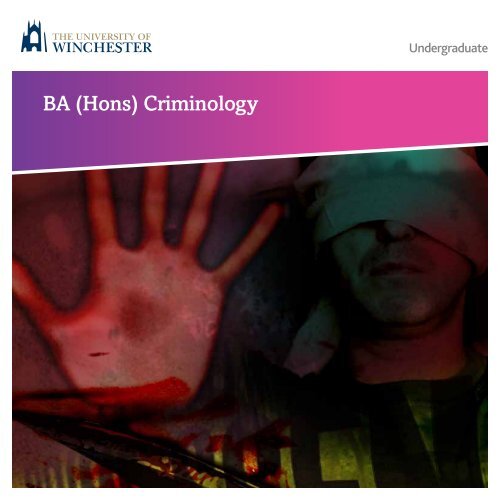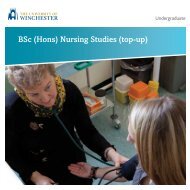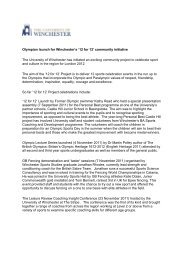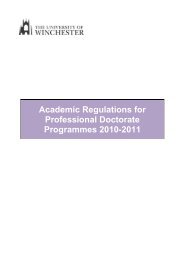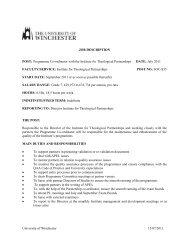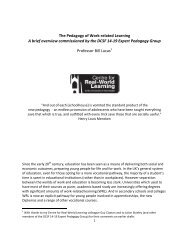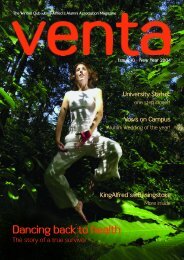BA (Hons) Criminology - University of Winchester
BA (Hons) Criminology - University of Winchester
BA (Hons) Criminology - University of Winchester
Create successful ePaper yourself
Turn your PDF publications into a flip-book with our unique Google optimized e-Paper software.
<strong>BA</strong> (<strong>Hons</strong>) <strong>Criminology</strong><br />
Undergraduate
Why study at <strong>Winchester</strong>?<br />
There are many reasons to study at the <strong>University</strong><br />
<strong>of</strong> <strong>Winchester</strong> – but the one to consider most<br />
is that you will become part <strong>of</strong> a safe and<br />
supportive community.<br />
The <strong>University</strong> is located within walking distance<br />
<strong>of</strong> the city centre <strong>of</strong> <strong>Winchester</strong>, which is only one<br />
hour away from London by train. The campus is<br />
located in a beautiful wooded setting overlooking<br />
the South Downs.<br />
Our graduates have a strong track record <strong>of</strong><br />
finding employment after leaving the <strong>University</strong>.<br />
There is a dedicated Careers Service to provide<br />
advice and help you research career pathways and<br />
employers. They also organise recruitment fairs<br />
and workshops on how to write CVs and perform<br />
well at interview.<br />
We have excellent facilities for learning and<br />
teaching that are continually being updated to<br />
enhance the student experience. There is a vibrant<br />
Student Union, excellent sports facilities, a<br />
modern library and IT facilities across the campus.<br />
At the <strong>University</strong> <strong>of</strong> <strong>Winchester</strong> we aim to provide<br />
campus or <strong>University</strong> Managed Accommodation<br />
to all first year full-time undergraduates who hold<br />
<strong>Winchester</strong> as their firm choice. In addition, we<br />
also endeavour to provide students from non-EU<br />
countries and students with disabilities a room<br />
on campus, not just for their first year, but for the<br />
duration <strong>of</strong> their course.<br />
The culture <strong>of</strong> the <strong>University</strong> is informal and the<br />
emphasis is on you unlocking your potential,<br />
developing a clear sense <strong>of</strong> direction and<br />
becoming the best you can be in your chosen<br />
career.<br />
2 www.winchester.ac.uk
<strong>BA</strong> <strong>Criminology</strong><br />
<strong>Criminology</strong> has become one <strong>of</strong> the<br />
most significant disciplines in the social<br />
sciences, reflecting a growing interest<br />
in crime, criminal behaviour and the<br />
criminal justice system. As a discipline,<br />
<strong>Criminology</strong> draws on theories,<br />
knowledge and methods from within the<br />
social sciences and humanities.<br />
At the <strong>University</strong> <strong>of</strong> <strong>Winchester</strong> this is<br />
especially the case in relation to Sociology,<br />
Psychology, Political Science, Archaeology,<br />
Media Studies, Investigative Journalism<br />
and Law; to consider the nature and<br />
construction <strong>of</strong> crime, why people <strong>of</strong>fend,<br />
policy making and the consequences <strong>of</strong><br />
crime. In this respect <strong>Criminology</strong> at the<br />
<strong>University</strong> <strong>of</strong> <strong>Winchester</strong> is truly what the<br />
British Society <strong>of</strong> <strong>Criminology</strong> (2007) refer<br />
to as a ‘rendezvous discipline’; “a site at<br />
which social scientific disciplines interact…<br />
[an] aspect that makes <strong>Criminology</strong> a<br />
distinct discipline in its own right”.<br />
At <strong>Winchester</strong>, students <strong>of</strong> <strong>Criminology</strong><br />
will be part <strong>of</strong> a wider community <strong>of</strong><br />
social sciences and humanities within the<br />
<strong>University</strong>. In this respect the programme<br />
places a strong emphasis on not only<br />
developing links with tutors and students<br />
across the <strong>University</strong> in other subject<br />
areas and disciplines, but also in providing<br />
opportunities to engage with those<br />
agencies, organisations and individuals<br />
currently involved in crime related<br />
pr<strong>of</strong>essions and occupations.<br />
In this context the <strong>BA</strong> <strong>Criminology</strong><br />
programme utilises and brings together<br />
tutors, researchers and expertise from<br />
faculties and departments across the<br />
<strong>University</strong> to develop and deliver the<br />
<strong>Criminology</strong> programme. These include<br />
Sociology, Psychology, Social Policy,<br />
Politics, Media, Investigative Journalism,<br />
Archaeology, Drama and Youth and<br />
Community Studies, thereby emphasising<br />
the interdisciplinary nature <strong>of</strong> <strong>Criminology</strong>.<br />
In addition to the expertise within the<br />
<strong>University</strong>, the programme will work in<br />
partnership with agencies, organisations<br />
and individuals external to the <strong>University</strong><br />
involved in a range <strong>of</strong> aspects <strong>of</strong><br />
<strong>Criminology</strong> and crime related pr<strong>of</strong>essions,<br />
occupations and issues. These will include<br />
the police, prison and probation service,<br />
representatives <strong>of</strong> the legal services and<br />
pr<strong>of</strong>essions, those involved in youth,<br />
community and safety sectors as well as<br />
various members <strong>of</strong> the security services<br />
and former prisoners and <strong>of</strong>fenders. This<br />
FACT FILE<br />
Typical <strong>of</strong>fer: 280-320 points*<br />
Single and Combined Honours<br />
Combined Honours programmes enable<br />
you to study two subjects jointly<br />
(50%/50%) and it is possible to transfer<br />
to a Single Honours programme at the<br />
end <strong>of</strong> Year 1<br />
Access: Pass<br />
International Baccalaureate: 26 points<br />
Degree duration:<br />
3 years full-time<br />
6 years part-time<br />
If English is not your first language:<br />
IELTS 6.0 (including 6.0 in writing) or<br />
a TOEFL score <strong>of</strong> 550 (paper-based) or<br />
213 (computer-based) or equivalent<br />
*Entry requirements correct at time <strong>of</strong><br />
print. For the most up-to-date entry<br />
requirements please visit our website<br />
at www.winchester.ac.uk<br />
www.winchester.ac.uk 1
<strong>BA</strong> <strong>Criminology</strong><br />
approach enables both the teaching team<br />
and the students <strong>of</strong> <strong>Criminology</strong> to engage<br />
with a range <strong>of</strong> relevant areas, issues and<br />
contacts outside the <strong>University</strong>, thereby<br />
providing the programme with a firm<br />
footing in the world outside academia.<br />
As <strong>Criminology</strong> is both a theoretical and<br />
empirical discipline, it aims to provide the<br />
student with an understanding <strong>of</strong> the key<br />
theoretical perspectives and concepts in<br />
explaining its subject matter, as well as the<br />
opportunity to test and put into practice<br />
some <strong>of</strong> those explanations in relation to<br />
the substantive issues addressed by the<br />
discipline. Additionally, the programme<br />
is about the development <strong>of</strong> both subject<br />
specific and generic knowledge and skills.<br />
As such a major feature <strong>of</strong> the delivery<br />
<strong>of</strong> the <strong>BA</strong> <strong>Criminology</strong> programme is the<br />
engagement <strong>of</strong> the student not only with<br />
key theories, perspectives and concepts<br />
which underpin the substantive aspect<br />
<strong>of</strong> <strong>Criminology</strong>, but also to facilitate the<br />
student in engaging with those issues and<br />
topics in a manner which serves to develop<br />
their understanding <strong>of</strong> <strong>Criminology</strong> in<br />
practice. Throughout the three year<br />
programme a number <strong>of</strong> modules will<br />
facilitate opportunities for such student<br />
engagement.<br />
In addition to the programme <strong>of</strong>fering<br />
those core aspects <strong>of</strong> undergraduate<br />
study in <strong>Criminology</strong>, there are several<br />
modules at Year 2 and Year 3 which are<br />
distinct to the <strong>BA</strong> at <strong>Winchester</strong>. Modules<br />
such as Criminological Investigation:<br />
Miscarriages <strong>of</strong> Justice (linked to the INUK<br />
Innocence Project Network), Applied<br />
Techniques: Forensic Archaeology and<br />
Crime, Media and Culture (Year 2) as well<br />
as Crime and Humanity and <strong>Criminology</strong><br />
and Pr<strong>of</strong>essional Development: Planning<br />
for Employment (Year 3) will <strong>of</strong>fer the<br />
student opportunities to develop skills,<br />
understanding and insights into aspects <strong>of</strong><br />
<strong>Criminology</strong> quite unique to <strong>Winchester</strong>.<br />
The <strong>BA</strong> <strong>Criminology</strong> programme at<br />
<strong>Winchester</strong> has been designed to provide<br />
students with an exciting and attractive<br />
programme which will enhance their<br />
transferable skills, knowledge and<br />
academic understanding in preparation<br />
for entering the graduate job and<br />
career market. Within this context the<br />
programme includes, at the beginning <strong>of</strong><br />
final year, the module <strong>Criminology</strong> and<br />
Pr<strong>of</strong>essional Development: Planning for<br />
Employment; this module highlights and<br />
makes explicit the links between critical<br />
academic theory, technical knowledge<br />
and generic skills, thereby addressing<br />
both the QAA <strong>Criminology</strong> Employability<br />
Benchmarks and the UCAS Employability<br />
Pr<strong>of</strong>ile for <strong>Criminology</strong>. Specifically within<br />
this module, but also throughout the<br />
entire programme, the aim is to bring<br />
together the methodological, academic<br />
and practical skills essential to pr<strong>of</strong>essional<br />
development and career opportunities.<br />
Within this specific module, but also<br />
throughout the programme, students<br />
will engage with various crime related<br />
pr<strong>of</strong>essionals, agencies and organisations<br />
where they will be able to develop<br />
their knowledge and understanding <strong>of</strong><br />
various occupations, opportunities and<br />
requirements for recruitment.<br />
Students will also have the opportunity<br />
to become a member <strong>of</strong> The British<br />
Society <strong>of</strong> <strong>Criminology</strong>, which has been in<br />
existence for 50 years, and is the society<br />
for criminologists, both academic and<br />
pr<strong>of</strong>essional, within the United Kingdom.<br />
The society aims to further the interests<br />
and knowledge <strong>of</strong> those engaging with<br />
crime, criminal behaviour and the criminal<br />
justice system. Members can enjoy a<br />
range <strong>of</strong> benefits, including networking<br />
opportunities and subscriptions to key<br />
publications.<br />
2 www.winchester.ac.uk
<strong>BA</strong> <strong>Criminology</strong><br />
The <strong>BA</strong> <strong>Criminology</strong> programme at the<br />
<strong>University</strong> endeavours to retain the<br />
distinctive nature <strong>of</strong> <strong>Criminology</strong> and in<br />
this respect the aim <strong>of</strong> the <strong>Winchester</strong><br />
brand <strong>of</strong> <strong>Criminology</strong> is to produce<br />
graduates equipped with the necessary<br />
knowledge, skills, insights, experiences<br />
and understanding which will facilitate<br />
and enhance their opportunities <strong>of</strong><br />
employment and further development<br />
within those careers referred to above.<br />
Programme content<br />
Overall the programme encourages critical<br />
enquiry and independent thinking in<br />
assessing trends, policies and practices in<br />
relation to areas <strong>of</strong> crime, crime prevention<br />
and the criminal justice system. Students<br />
acquire skills <strong>of</strong> gathering data using<br />
quantitative and qualitative methods,<br />
synthesising and interpreting evidence<br />
and assembling arguments, presenting<br />
evidence and formulating findings and<br />
conclusions. Good spoken and written<br />
communication skills are developed using a<br />
variety <strong>of</strong> modes.<br />
Year 1<br />
Year 1 is foundational and provides the<br />
basis for more specialised study in Years<br />
2 and 3. Year 1 introduces students to the<br />
key theories, concepts and perspectives<br />
within <strong>Criminology</strong>, its interdisciplinary<br />
nature and the range and scope <strong>of</strong> the<br />
issues and topics explored by <strong>Criminology</strong>.<br />
Modules<br />
Key Thinkers and Themes in<br />
Conceptualised Crime<br />
This module introduces the range <strong>of</strong> ways<br />
by which crime has been conceptualised<br />
focusing on the different fields <strong>of</strong> study<br />
that contribute to criminology, including<br />
areas <strong>of</strong> investigation such as crime and<br />
culture, crime and everyday life, violent<br />
crime, victims and crime, age and crime,<br />
mental disorder and criminality amongst<br />
others. The module examines a range <strong>of</strong><br />
key themes that have been present in<br />
criminological writing for many years as<br />
well as more contemporary perspectives<br />
that have emerged in response to the<br />
challenges posed by modern society.<br />
inevitable part <strong>of</strong> literature for hundreds <strong>of</strong><br />
years. This module explores depictions <strong>of</strong><br />
<strong>of</strong>fenders in fiction both historically and in<br />
more contemporary settings, understanding<br />
how such depictions are products <strong>of</strong><br />
their time. This focus on literature will be<br />
complemented by portrayals <strong>of</strong> crime<br />
and criminals in film and other media, for<br />
example, comics and graphic novels.<br />
Police and Police Work<br />
The police are one <strong>of</strong> the most important<br />
parts <strong>of</strong> the criminal justice system and<br />
also one <strong>of</strong> the most scrutinised. The<br />
module examines the work conducted by<br />
the police in England and Wales with key<br />
debates centred on the role <strong>of</strong> the police<br />
with respect to the rest <strong>of</strong> society. Issues<br />
such as policing by consent, the arming<br />
<strong>of</strong> police and the modern challenges the<br />
The programme is designed to provide<br />
a fully-rounded understanding <strong>of</strong><br />
criminological theories and methodologies.<br />
Portrayals <strong>of</strong> Crime and Deviance<br />
Because <strong>of</strong> the fascination that societies have<br />
had with crime and those who commit it,<br />
depictions <strong>of</strong> <strong>of</strong>fenders have been an almost<br />
www.winchester.ac.uk 3
<strong>BA</strong> <strong>Criminology</strong><br />
police face as new forms <strong>of</strong> disorder pose<br />
new difficulties plus community policing<br />
and the policing <strong>of</strong> terrorism will also be<br />
explored during the module.<br />
Crime and Justice in the 19th Century<br />
The experiences that history can teach<br />
us are very useful for understanding<br />
current dilemmas and conceptualising<br />
social problems and criminal behaviour.<br />
This module looks at a variety <strong>of</strong> different<br />
historical issues and lessons that can<br />
be derived from historical perspectives<br />
on crime. It traces the development<br />
<strong>of</strong> particular aspects <strong>of</strong> crime and<br />
punishment, such as organised crime and<br />
slavery, the historical origins <strong>of</strong> juvenile<br />
delinquency in Victorian England, violent<br />
crime in history, the establishment <strong>of</strong> the<br />
police and the criminal justice system,<br />
issues <strong>of</strong> punishment from transportation<br />
through to capital punishment. It also<br />
explores how gender perspectives<br />
contributed to associations <strong>of</strong> particular<br />
<strong>of</strong>fences with women.<br />
Introduction to <strong>Criminology</strong> 1:<br />
Perceptions and Perspectives<br />
This module introduces and explores the<br />
various disciplinary approaches to the<br />
study <strong>of</strong> crime. It will also explore the<br />
social construction <strong>of</strong> crime, as well as the<br />
representation <strong>of</strong> crime and the criminal<br />
justice system. The module will begin<br />
to introduce and explore the range and<br />
scope <strong>of</strong> issues and topics examined by<br />
the specialist discipline <strong>of</strong> <strong>Criminology</strong>.<br />
This module will serve as a link to those<br />
substantive aspects <strong>of</strong> <strong>Criminology</strong> to<br />
be addressed in Years 2 and 3 <strong>of</strong> the<br />
programme.<br />
Social Policy<br />
This module provides an introduction to<br />
the field <strong>of</strong> social policy. It will develop<br />
the understanding <strong>of</strong> the complexity <strong>of</strong><br />
modern societies and how nation states<br />
protect their citizens through the creation<br />
and implementation <strong>of</strong> social policies. It<br />
will provide an understanding <strong>of</strong> the policymaking<br />
and legislative processes as well<br />
as introduce some <strong>of</strong> the key concepts in<br />
social policy (for example need, justice and<br />
choice).<br />
Developing Academic and<br />
Pr<strong>of</strong>essional Skills<br />
Central to this module is the preparation<br />
<strong>of</strong> personal development plans. This is<br />
designed to help meet learning needs<br />
relating to a range <strong>of</strong> key learning skills<br />
necessary for successful study at higher<br />
education level. During this module,<br />
there will be the opportunity to develop<br />
traditional study skills, and also more<br />
generic skills, such as how to plan, record<br />
and reflect on personal development.<br />
Introduction to <strong>Criminology</strong> 2:<br />
Communities, Identities and Crime<br />
Through this module there will be an<br />
examination <strong>of</strong> the social construction <strong>of</strong><br />
identity and community. The notions <strong>of</strong><br />
social difference, equality, diversity and<br />
citizenship in a society deemed to be under<br />
stress from globalisation and migration<br />
will also be examined through a focus on<br />
issues relating to gender, sexuality, race<br />
and ethnicity within a criminological and<br />
criminal justice context.<br />
Year 2<br />
Year 2 builds upon the foundation and<br />
introduction <strong>of</strong> Year 1 but has primarily<br />
a three-fold focus; development <strong>of</strong><br />
theoretical understanding <strong>of</strong> the<br />
concepts and perspectives underpinning<br />
<strong>Criminology</strong>; development <strong>of</strong> research<br />
skills and understanding <strong>of</strong> the research<br />
process and exploring aspects <strong>of</strong> the<br />
criminal justice system.<br />
4<br />
www.winchester.ac.uk
<strong>BA</strong> <strong>Criminology</strong><br />
Modules<br />
Criminological Theory<br />
This module will examine the<br />
interdisciplinary nature <strong>of</strong> and various<br />
approaches to criminological theory. It<br />
will provide an overview and context <strong>of</strong><br />
the development <strong>of</strong> criminological theory<br />
as well as examining some <strong>of</strong> the main<br />
criminological theories which have sought<br />
to explain and account for crime and<br />
criminality in the modern era.<br />
Criminological Research<br />
This module will outline and examine<br />
the criminological research process<br />
from the planning stage through to<br />
data analysis and presentation <strong>of</strong><br />
findings. The module will also critically<br />
examine the quantitative and qualitative<br />
approaches to research as well as the<br />
limitations <strong>of</strong> research. There will also be<br />
a critical exploration <strong>of</strong> the realities and<br />
practicalities <strong>of</strong> research. An exploration<br />
<strong>of</strong> the ethical and political issues raised<br />
through doing criminological research into<br />
issues and topics <strong>of</strong> a sensitive and illegal<br />
nature will also be included within this<br />
module.<br />
Contemporary Criminological Issues<br />
This module will explore and examine<br />
issues within the scope <strong>of</strong> <strong>Criminology</strong><br />
which are both contemporary and<br />
topical. In this respect the issues<br />
addressed will be a combination <strong>of</strong> those<br />
deemed contemporary and yet central<br />
to criminological investigation. This<br />
module will address themes such as white<br />
collar and corporate crime, victims and<br />
victimisation, drugs, alcohol and crime,<br />
violent crime and protest and social<br />
movements amongst others.<br />
Criminal Justice and Punishment<br />
This module will focus on two major<br />
aspects <strong>of</strong> society’s response to crime; the<br />
criminal justice system and the punishment<br />
handed to those found guilty <strong>of</strong> criminal<br />
actions, as well as the traditional means<br />
<strong>of</strong> punishment such as imprisonment.<br />
The module will introduce the nature and<br />
structure <strong>of</strong> the criminal justice system,<br />
examining the inter-relationships between<br />
the major institutions <strong>of</strong> the system such as<br />
the police and the courts. It will also explore<br />
issues surrounding questions <strong>of</strong> guilt and<br />
innocence, miscarriages <strong>of</strong> justice and crime<br />
control.<br />
Criminological Investigation:<br />
Miscarriages <strong>of</strong> Justice/Innocence Project<br />
Overall this module will explore the<br />
issues surrounding wrongful conviction<br />
and miscarriages <strong>of</strong> justice; as such the<br />
module will combine theory with practice<br />
in examining this aspect <strong>of</strong> criminal justice.<br />
The module will introduce students to the<br />
Innocence Project; an opportunity to work<br />
on ‘live’ cases where wrongful conviction<br />
is claimed by serving prisoners after all<br />
appeal processes have been exhausted. The<br />
<strong>Winchester</strong> Innocence Project is part <strong>of</strong> the<br />
Innocence Network UK (INUK).<br />
Topics in Psychology and Law<br />
This module will provide students with the<br />
opportunity to study some topics related<br />
to psychology, crime and law. Students<br />
will be introduced to a small number <strong>of</strong><br />
key topics which may include Pro and<br />
Anti-social Behaviour; Children and the<br />
Law; Eyewitness Memory and Testimony;<br />
www.winchester.ac.uk 5
<strong>BA</strong> <strong>Criminology</strong><br />
Investigative Psychology and the Police;<br />
and Psychology, Law and the Media.<br />
Applied Techniques: Forensic<br />
Archaeology<br />
Forensic Archaeologists have played a<br />
key role in Crime Scene Investigation<br />
(CSI); this module will emphasise the<br />
importance <strong>of</strong> careful, systematic and<br />
multidisciplinary survey, excavation and<br />
post-excavation study, for example the<br />
approach required to locate, investigate<br />
and report on discoveries made at a<br />
crime scene. The module provides an<br />
introduction to the objectives, approaches<br />
and methods <strong>of</strong> forensic archaeology and<br />
is then organised in the sequence that a<br />
real police investigation involving forensic<br />
archaeologists would follow.<br />
Crime, Media and Culture<br />
In this module there will be an opportunity<br />
to explore the relationship between the<br />
media and crime and ‘deviant behaviour’.<br />
Crime has always been a theme for popular<br />
media but in the contemporary world<br />
new and old media have become tools for<br />
policing and social control. At the same<br />
time, critics suggest that the popular media<br />
have an important role in the construction<br />
<strong>of</strong> particular discourses or ideologies <strong>of</strong><br />
crime and punishment. This module explores<br />
these themes using a range <strong>of</strong> contemporary<br />
and established theoretical approaches.<br />
Year 3<br />
Year 3 focuses on some <strong>of</strong> the more<br />
specialised aspects <strong>of</strong> <strong>Criminology</strong>, as well<br />
as encouraging students to work in a more<br />
independent manner and to begin to consider<br />
their career options upon graduation. In<br />
this respect at the start <strong>of</strong> Year 3 there<br />
is a mandatory employability dedicated<br />
module <strong>Criminology</strong> and Pr<strong>of</strong>essional<br />
Development: Planning for Employment<br />
(at present available only to Single Honours<br />
students). This module encourages the<br />
student to reflect upon their learning and<br />
development, linking their academic and<br />
generic skills and knowledge to that <strong>of</strong> the<br />
requirements <strong>of</strong> the employment market.<br />
Modules<br />
Research Dissertation<br />
Following two years <strong>of</strong> criminological<br />
study, students have the opportunity to<br />
develop further study into an area or topic<br />
<strong>of</strong> their own choice and interest, and to<br />
undertake a piece <strong>of</strong> independent research.<br />
The student will identify a topic <strong>of</strong> interest,<br />
provide a rationale for the research, devise<br />
and submit a research proposal, conduct a<br />
piece <strong>of</strong> research and write up and present<br />
the project and main findings.<br />
<strong>Criminology</strong> and Pr<strong>of</strong>essional<br />
Development: Planning for Employment<br />
This module is a dedicated employability<br />
module designed specifically for the<br />
undergraduate <strong>Criminology</strong> curriculum.<br />
As such the module has been created after<br />
consultation with potential employers and<br />
pr<strong>of</strong>essional practitioners within the prison,<br />
police and probation services as well as<br />
those working in the youth, community<br />
and private sectors. The module will<br />
explore potential links between researching<br />
for academic work and researching for<br />
relevant career applications in developing<br />
awareness <strong>of</strong> pr<strong>of</strong>essional practice in<br />
pr<strong>of</strong>essions and organisations related to<br />
<strong>Criminology</strong>.<br />
Policing Society<br />
This module will focus upon the role <strong>of</strong><br />
police and policing in a modern, diverse<br />
and globalised society. Following a brief<br />
history <strong>of</strong> policing in the UK, the module<br />
will go on to focus upon the functions and<br />
powers <strong>of</strong> the modern police force and<br />
issues <strong>of</strong> governance and accountability,<br />
as well as police discretion and aspects <strong>of</strong><br />
discrimination.<br />
6 www.winchester.ac.uk
<strong>BA</strong> <strong>Criminology</strong><br />
Sex Crime: Criminal Justice and<br />
Civil Measures<br />
Sex crime is <strong>of</strong>ten seen as different<br />
from other forms <strong>of</strong> crime. Also, within<br />
civil society and the prison system sex<br />
<strong>of</strong>fenders are also seen as different from<br />
other <strong>of</strong>fenders and treated accordingly.<br />
This highly personalised form <strong>of</strong> violence<br />
and crime raises questions in relation<br />
to the care, treatment and attitudes<br />
towards victims within the criminal<br />
justice system. In addition the module<br />
will also explore the issues <strong>of</strong> media<br />
reporting <strong>of</strong> sex related crimes, sex and<br />
the internet, child sex abuse, prostitution<br />
and the treatment and monitoring <strong>of</strong><br />
known sex <strong>of</strong>fenders.<br />
Young People, Deviance and Crime<br />
The module will start by exploring the<br />
Youth-Crime connection and consider<br />
the problem <strong>of</strong> Youth and the problem<br />
<strong>of</strong> Crime. Gender issues in crime will<br />
be considered and the involvement <strong>of</strong><br />
young people in deviant and criminal<br />
behaviour will be critically evaluated.<br />
The youth justice system will be critically<br />
considered and means <strong>of</strong> preventing antisocial,<br />
deviant and criminal behaviour<br />
explored.<br />
Globalised Crime: Organised Crime and<br />
Cybercrime<br />
This module will explore two specific<br />
aspects <strong>of</strong> crime in the globalised world;<br />
organised crime and cybercrime. While<br />
cybercrime is certainly a crime <strong>of</strong> the late<br />
20th and early 21st century, organised<br />
crime has deeper historical roots. However,<br />
in the globalised world, aided by advances<br />
in computer technology, organised crime<br />
has taken on a globalised dimension.<br />
The module will examine the historical<br />
roots <strong>of</strong> organised crime as well as<br />
looking at traditional and contemporary<br />
manifestations such as the triads and<br />
mafia; types <strong>of</strong> crime such as human<br />
and drug trafficking, people smuggling,<br />
kidnapping and extortion will also be<br />
explored.<br />
In relation to cybercrime the module will<br />
look at the advent, nature and extent<br />
<strong>of</strong> this form <strong>of</strong> criminal activity, where<br />
every individual and organisation that<br />
uses ICT is potentially both a perpetrator<br />
and a victim <strong>of</strong> crime. As the fastest<br />
growing sites <strong>of</strong> crime the module will<br />
examine aspects <strong>of</strong> cybercrime for<br />
example hacking, identity theft, fraud,<br />
pornography and grooming.<br />
Crime and Humanity<br />
This module will focus upon the notion <strong>of</strong><br />
crimes against humanity and its interrelated<br />
aspects. The module will introduce<br />
the historical context to the setting up<br />
<strong>of</strong> the United Nations and the creation<br />
<strong>of</strong> the Universal Declaration <strong>of</strong> Human<br />
Rights. Using case studies such as Northern<br />
Ireland, Rwanda, Bosnia and Chechnya, the<br />
module will explore contentious concepts<br />
and issues <strong>of</strong> war, terrorism and genocide.<br />
The protection and abuse <strong>of</strong> civilian and<br />
non-combatant populations in on-going<br />
conflict zones, war crimes, crimes against<br />
humanity, ‘ethnic cleansing’, use <strong>of</strong> torture,<br />
the treatment <strong>of</strong> prisoners <strong>of</strong> war and<br />
prisoners <strong>of</strong> conscience as well as detention<br />
without trial will also be explored.<br />
www.winchester.ac.uk 7
<strong>BA</strong> <strong>Criminology</strong><br />
Learning and teaching<br />
The <strong>Criminology</strong> programme adopts<br />
a diverse range <strong>of</strong> teaching methods<br />
including lectures, seminars, tutorials,<br />
guided reading exercises, independent<br />
study, group work, debates, guest speakers<br />
and individual project supervision. At<br />
all points, theory and academic study is<br />
related to real world experience. These<br />
teaching methods are designed to support<br />
students’ learning and progression, from<br />
initial support and guidance in Year 1 to<br />
more independent and self-directed study<br />
in Year 3.<br />
As students progress, they are encouraged<br />
to develop and implement a more critical<br />
stance to criminological theories, findings<br />
and approaches, as well as acquire a<br />
range <strong>of</strong> generic and subject-specific<br />
skills and abilities such as written and<br />
oral communication, developing effective<br />
analysis, argument, interpretation and<br />
evaluation skills.<br />
Assessment<br />
Assessment is a crucial part <strong>of</strong> a high<br />
quality learning experience. It is a way<br />
<strong>of</strong> measuring a student’s knowledge,<br />
understanding and skills. In accordance<br />
with the Code <strong>of</strong> Practice produced by the<br />
Quality Assurance Agency, the <strong>Criminology</strong><br />
programme uses a range <strong>of</strong> modes<br />
<strong>of</strong> assessment to assess achievement<br />
accurately and fairly. Students will be<br />
expected to write essays and reports, sit<br />
examinations, give presentations and<br />
debate issues for example. Students are<br />
made aware <strong>of</strong> assessment matters at the<br />
beginning <strong>of</strong> a module through the module<br />
guide.<br />
Feedback is given to students in order<br />
to help them improve their performance<br />
in the future. Internal moderation takes<br />
place for every module, with a sample<br />
<strong>of</strong> assignments also forwarded to the<br />
External Examiner for scrutiny. All marks<br />
are provisional until confirmed by the<br />
Examination Board in the summer.<br />
Support networks<br />
The programme actively encourages<br />
students to form support groups to assist<br />
with learning and make the learning<br />
experience easier. These are small groups<br />
<strong>of</strong> students who meet on a regular basis<br />
to discuss criminological issues. Students<br />
find these informal groups rewarding and<br />
enriching.<br />
Career opportunities<br />
A degree in <strong>Criminology</strong> provides a range<br />
<strong>of</strong> opportunities for graduates. Graduates<br />
with degrees in <strong>Criminology</strong> can pursue<br />
a range <strong>of</strong> different career opportunities<br />
including employment in public or private<br />
policing and research, HM Revenue and<br />
Customs, probation services, prison and<br />
other crime-related roles. The Home<br />
Office, legal firms and other relevant<br />
support roles in crime-related work are<br />
also potential employment routes.<br />
Contact us<br />
Course Enquiries and Applications<br />
Telephone: +44 (0) 1962 827234<br />
Email: course.enquiries@winchester.ac.uk<br />
8 www.winchester.ac.uk
Explore the <strong>Winchester</strong> experience<br />
Open Days are a great way to find out more<br />
about the course that you are interested in. It is<br />
also an opportunity to explore the campus and<br />
meet tutors and current students to discover<br />
what studying at <strong>Winchester</strong> is all about.<br />
To find out when the next Open Day is visit<br />
www.winchester.ac.uk/opendays or contact the<br />
Student Recruitment team.<br />
Campus Tour instead by contacting the Student<br />
Recruitment team.<br />
Student Recruitment<br />
Telephone: +44 (0) 1962 827089<br />
Email: opendays@winchester.ac.uk<br />
At the event, academics from all <strong>of</strong> our<br />
programmes will be around campus giving<br />
sessions about your subject <strong>of</strong> interest. Each<br />
<strong>of</strong> the sessions will include an overview <strong>of</strong> the<br />
course, entry requirements, the application<br />
process and an opportunity to ask any questions<br />
you might have.<br />
Student Union representatives will also be<br />
available so you can find out more about<br />
<strong>Winchester</strong>’s sports clubs, societies and<br />
community involvement.<br />
As part <strong>of</strong> the campus tour you will see the halls<br />
<strong>of</strong> residence and the West Downs Student Village<br />
and find out more about living in <strong>Winchester</strong>.<br />
You will also be told about the student support<br />
services and scholarships and bursaries that are<br />
on <strong>of</strong>fer.<br />
If you miss any <strong>of</strong> the Open Days or are<br />
unavailable<br />
www.winchester.ac.uk<br />
to attend – you can arrange a
Finding out more...<br />
Course Enquiries and Applications<br />
Telephone: +44 (0)1962 827234<br />
Email: course.enquiries@winchester.ac.uk<br />
The <strong>University</strong> <strong>of</strong> <strong>Winchester</strong><br />
<strong>Winchester</strong><br />
Hampshire S022 4NR<br />
www.winchester.ac.uk<br />
03991/09/13<br />
a large print version <strong>of</strong> this<br />
booklet is available on request


